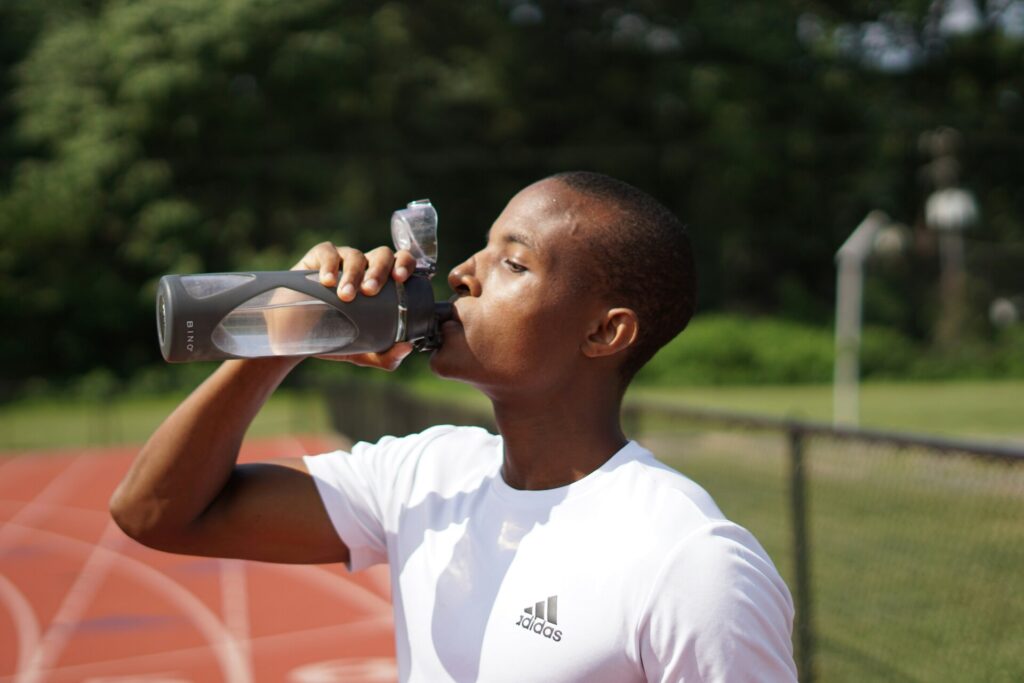Carbohydrates are a runner’s primary fuel—before, during, and after a workout. Having a smart carbs plan helps runners sustain energy, support consistent pacing, and promote faster recovery.
Running places unique demands on your body, and carbs are the quickest, most reliable way to meet them. Without enough, your glycogen stores deplete, leading to fatigue, a drop in pace, and sluggish recovery. With proper timing and carb intake, you can maintain energy across long distances, avoid mid-run crashes, and recover stronger between sessions.
For example, have oatmeal with fruit to top off glycogen before a run, take an energy gel around minute 40 to prevent fatigue, and refuel with rice and lean protein within an hour post-run. This simple plan helps you maintain your pace and recover with less soreness.
In this guide, you’ll get clear, practical advice on what smart carbs are, how they work, and when to use them—before, during, and after you run. You will find sample fueling plans, easy-to-follow food examples, and tips to avoid common carb mistakes that can drain your energy or delay recovery.
Whether you are training for your first 5K or aiming for a new marathon PR, this is your go-to roadmap for making carbs work for your routine, not the other way around.
What are Smart Carbs for Runners?
Smart carbs are carbohydrates that fuel your body efficiently—at the right time, with the right effect. Unlike refined sugars that spike energy and then crash, smart carbs offer steadier fuel, faster absorption, and more reliable support for recovery—helping you bounce back from post-workout blues.
Running requires both sustained energy and short bursts of power, which makes carb timing crucial. Slow-digesting carbs, such as oats, brown rice, and sweet potatoes, provide a consistent energy supply for pre-run meals. These replenish glycogen reserves so your muscles have available energy at the start. In contrast, fast-digesting carbs like bananas, white rice, sports gels, or carb-rich drinks are absorbed quickly to give an instant energy boost mid-run or aid faster recovery afterward.
For example, having oatmeal with berries before a long run provides slow-burning fuel to carry you through the early miles. Around the 45-minute mark, a gel or sports drink can give you the quick lift you need to avoid crashing and maintain pace.
Smart carbs aren’t about eating more; they are about eating with intention. By combining slow- and fast-digesting carbs strategically, you provide your body with steady energy, timely boosts, and the nutrients it needs to perform and recover efficiently.
Why Every Runner Needs a Carbs Intake Plan?
Understanding how carbs fit into a healthy diet is especially important for runners, as carbohydrates remain the body’s most effective and readily available energy source during exercise. When you run, your muscles rely on a quick fuel supply. Carbs convert into glucose more quickly than fats or proteins, making them crucial for sustaining energy and accelerating recovery.
Here’s how they help:
- Primary fuel for movement: Carbs are your body’s go-to energy source, especially during high-intensity or long-distance runs.
- Stored as glycogen: Your muscles and liver store carbs as glycogen, which your body uses first when running. When glycogen runs low, fatigue sets in.
- Delays fatigue: Topping off glycogen before a run helps maintain pace and avoid the dreaded “bonk” or energy crash.
- Speeds up recovery: After a run, carbs help restore glycogen levels, reduce soreness, and support muscle repair.
Carbs are accessible, versatile, and essential for anyone serious about performance. Whether you’re heading out for 30 minutes or training for a marathon, using smart carbs at the right time can make a measurable difference in how you run and how fast you bounce back.
What are the Best Carbs for Runners Before, During, and After Runs?
Knowing which carbs to eat, and when, is one of the most effective ways to improve your performance and recovery as a runner. Whether you’re training for your first 5K or preparing for race day, timing your carb intake makes a noticeable difference in energy, pacing, and post-run fatigue.
Pre-Run Carbs: What should you eat?
In the hours leading up to your run, slow-digesting carbs give your muscles the steady fuel they need to perform. Aim for a balanced pre-run meal about 2 to 3 hours before your session. This should include complex carbohydrates paired with a small amount of protein and fat to support sustained energy without digestive issues.
Examples:
- Oatmeal with banana and almond butter
- Brown rice with lean chicken and veggies
- Whole grain toast with eggs and avocado
If you’re running first thing in the morning or closer to your last meal, a lighter carb source about 30 to 60 minutes beforehand can help top up glycogen stores without weighing you down.
Quick snacks include:
- Banana
- Toast with jam
- Granola with berries and yogurt
The key is to stick with low-fiber, easily digestible carbs and avoid anything too heavy or greasy before lacing up.
Mid-Run Carbs: How to sustain energy for longer distances?
If your run lasts longer than 60 minutes, your body starts to deplete glycogen stores, and you will need to refuel on the go. Mid-run carbs help maintain blood sugar levels, prevent energy crashes, and delay the onset of fatigue.
General guidance is to consume 30 to 60 grams of carbs per hour, depending on your pace, effort level, and gut tolerance. For runs longer than 75 to 90 minutes, aim for the higher end of that range.
Effective mid-run options include:
- Sports gels or chews (typically 20 to 25 grams carbs each)
- Electrolyte carb drinks
- Fruit pouches (like pureed banana or applesauce)
- Dried fruit or fruit snacks in small portions
Start fueling around 30 to 45 minutes into the run, and continue in regular intervals, rather than waiting until you feel tired.
Post-Run Carbs: What carbs can help your body rebuild and recover?
After your run, carbs help restore muscle glycogen and jumpstart the recovery process, especially when paired with protein. Aim to eat within 30 to 60 minutes post-run when your muscles are most receptive to refueling.
The sweet spot is a 3:1 ot 4:1 ratio of carbs to protein, or approximately 60 grams of carbs and 15 to 20 grams of protein for most runners. This balance speeds up recovery, reduces soreness, and prepares your body for your next training session.
Smart post-run meals or snacks include:
- A post-workout smoothie with fruit, protein powder, and a spoonful of nut butter
- White rice or sweet potato with grilled chicken
- Whole grain wrap with hummus, lean protein, and veggies
- Chocolate milk and a piece of fruit
Skipping this window or under-fueling can delay recovery and leave you feeling drained for the rest of the day.
What Sample Fueling Plans Use Carbs for Runners Effectively?
Every run has different energy demands, and your fueling strategy should adjust accordingly. The table below breaks down sample carb intake plans for short training runs, long runs, and race day efforts. It includes approximate timing, portion sizes, and food examples to help you plan smarter.
Use these templates to guide your routine, but remember, individual preferences and gut tolerance will vary.
| Run Type | Fuel Timing | ||
| Pre-Run Fuel | Mid-Run Fuel | Post-Run Recovery | |
| Short Run (30 to 45 minutes) | Light snack (30 to 60 minutes before)
Example: Banana or toast with jam (~20 to 30 grams of carbs) |
Not required for most | Within 30 to 45 minutes:
Example: Smoothie with fruit and protein (~30 to 40 grams of carbs and ~10 to 15 grams of protein) |
| Long Run (60 to 90 minutes) | Balanced meal (2 to 3 hours before)
Example: Oatmeal with banana and nut butter (~60 to 80 grams of carbs and ~10 to 15 grams of protein) |
Start fueling at 30 to 40 minutes
Example: 1 gel (~25 grams of carbs) every 30 to 45 minutes Sports drink or fruit pouches |
Within 30 to 60 minutes
Example: Rice bowl with chicken and veggies (~60 grams of carbs and ~15 to 20 grams of protein) |
| Race Day (Half Marathon or longer) | Easily digested meal (2.5 to 3 hours before)
Example: White rice with egg (~80 to 100 grams of carbs and ~15 to 20 grams of protein) |
Start at 30 minutes
Example: Gel (25 to 30 grams of carbs) every 30 to 40 minutes Rotate gels and drinks for variety |
Within 30 to 45 minutes
Example: Pasta with lean meat and vegetables (60 to 90 grams of carbs and 20 grams of protein) |
Keep in mind: These plans are meant to be practiced—not just followed on race day. Adjust the carb types, portion sizes, and timing during training runs to figure out what feels best for your body. Some runners prefer solid food; others rely on liquid carbs. The key is consistency, not perfection.
How Can Carbs Go Wrong for Runners?
Carbohydrates are essential for energy and recovery, but when misused, they can have adverse effects. Mistakes in carb timing, type, or portion size are common, especially for newer runners. These missteps often lead to stomach issues, sluggish pacing, or prolonged muscle soreness.
Carbs digest at different speeds, which makes timing important. Eating too much fiber or heavy starches (like beans or salad) right before a run can cause cramps or digestive distress. Skipping mid-run fuel on longer efforts may result in glycogen depletion on a low-carbohydrate diet, leaving you fatigued and struggling to maintain pace. And when you don’t eat carbs after your run, your muscles stay depleted and recovery drags out longer than necessary.
A well-timed carb strategy makes a huge difference. Learn what works for your body, test it in training, and avoid these common fueling mistakes.
Dos and Don’ts of Carb Timing for Runners
| Dos | Don’ts |
|
|
Final Tip: Learn how to use carbs right, and they will power every mile without slowing you down.
Final Thought
For runners, carbs are not just calories, they are the body’s most efficient source of fuel for training, racing, and recovery. When timed well, carbs do more than energize, they help you maintain pace, reduce fatigue, and repair muscles faster after each session.
By aligning your carb intake before, during, and after your runs, you give your body the fuel it needs exactly when it needs it.
- Pre-run carbs prime your muscles.
- Mid-run carbs keep your energy steady.
- Post-run carbs restore and rebuild.
Start by making one small change, like adding a banana before your long run or a smoothie afterward, and see how your body responds. From there, refine your timing and food choices to match your needs and goals.
When used with intention, carbs become more than a food group, they become a performance strategy tailored to you.
Frequently Asked Questions (FAQs)
Commonly asked questions about carbs for runners.


